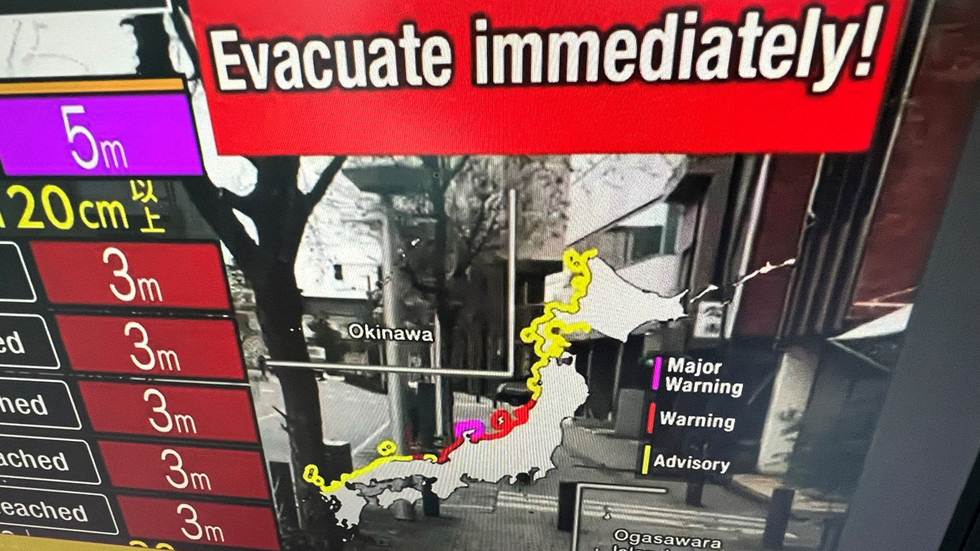
The authorities say the tremors have slightly damaged several nuclear power plants, albeit without hindering their operation
A tsunami alert aired by Japanese broadcaster NHK World, January 1, 2024. © Mladen ANTONOV / AFP
Japan’s western coast was hit by an earthquake followed by a tsunami on Monday. The authorities say that while the natural disaster affected several nuclear power plants to some extent, there have been no signs of any “abnormalities” so far.
In March 2011, the country was battered by devastating tremors and gigantic waves that left 18,000 dead and caused meltdowns at the Fukushima Nuclear Power Plant – the biggest such incident since the 1986 Chernobyl explosion in Soviet Ukraine.
The initial quake measured seven, the maximum intensity specified by the Japan Meteorological Agency’s Shindo seismic scale, which assesses the tremor’s severity at the surface.
Several aftershocks followed, with the agency issuing a tsunami warning for coastal Ishikawa, Niigata, Toyama, and Yamagata prefectures.
Speaking to reporters, Prime Minister Fumio Kishida appealed to people living “in areas where tsunamis are expected,” saying “I would like to request that they evacuate as soon as possible.”
According to the national broadcaster NHK, waves in some areas may have reached a height of 5 meters.
地震による津波の映像4、珠洲市やばい逃げて pic.twitter.com/SBcOcV9J0V
— 1000mg (@1000mg) January 1, 2024
Government spokesman Hayashi Yoshimasa said during an emergency press conference that the authorities were evaluating the extent of the damage caused by the earthquake and warned people to be ready for further tremors.
子供さんもいて妊娠中の家族を襲った地震凄まじい揺れだ…金沢市 pic.twitter.com/0HhmYOc9Nl
— K. (@moonspell_jp2) January 1, 2024
Meanwhile, multiple videos posted on social media show cracks in roads, partly collapsed buildings, and a fire.
まじで地震やばすぎて地割れしてるんだけど…津波到達してて緊急地震速報も出てるのでマジで早く逃げろ😭 pic.twitter.com/VWcGOezXnp
— How (@howsudust) January 1, 2024
Japan’s Nuclear Regulation Authority reported in a post on X (formerly Twitter) that the natural disaster has “caused damage to the Shiga Nuclear Power Plant in Shiga Town, Ishikawa Prefecture (maximum seismic intensity 7), and the Kashiwazaki-Kariwa Nuclear Power Plant in Kashiwazaki City and Kariwa Village, Niigata Prefecture (maximum seismic intensity 5+).”
これは酷い😓政府の迅速な対応求む🙏本当怪我など、二次被害に気をつけながら避難してください。#地震#津波#津波警報pic.twitter.com/QA2JKSPY2y
— Hide@書アートNFT熱狂部隊 隊長/CNPR2期生 (@hide_nekkyo) January 1, 2024
Officials hastened to add, however, that no “abnormalities” have been detected, with the watchdog continuing to monitor all the nuclear power plants in the affected areas.
READ MORE:
Earthquake kills over 100 people in China (VIDEOS)
While some of these facilities were not in operation at the time of the earthquake, the Kashiwazaki-Kariwa Nuclear Power Plant was put back online last Wednesday for the first time since 2012.
South Korea’s meteorological agency has notified citizens that sea levels off its eastern coast could rise as well.
Authorities in the Russian island region of Sakhalin have also issued a tsunami alert.




